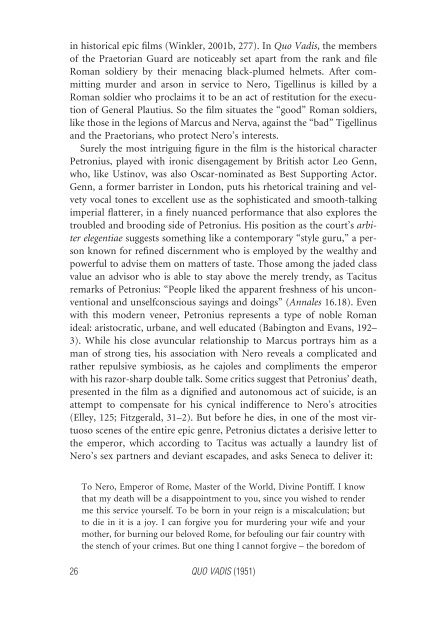Big Screen Rome - Amazon Web Services
Big Screen Rome - Amazon Web Services
Big Screen Rome - Amazon Web Services
You also want an ePaper? Increase the reach of your titles
YUMPU automatically turns print PDFs into web optimized ePapers that Google loves.
in historical epic films (Winkler, 2001b, 277). In Quo Vadis, the members<br />
of the Praetorian Guard are noticeably set apart from the rank and file<br />
Roman soldiery by their menacing black-plumed helmets. After committing<br />
murder and arson in service to Nero, Tigellinus is killed by a<br />
Roman soldier who proclaims it to be an act of restitution for the execution<br />
of General Plautius. So the film situates the “good” Roman soldiers,<br />
like those in the legions of Marcus and Nerva, against the “bad” Tigellinus<br />
and the Praetorians, who protect Nero’s interests.<br />
Surely the most intriguing figure in the film is the historical character<br />
Petronius, played with ironic disengagement by British actor Leo Genn,<br />
who, like Ustinov, was also Oscar-nominated as Best Supporting Actor.<br />
Genn, a former barrister in London, puts his rhetorical training and velvety<br />
vocal tones to excellent use as the sophisticated and smooth-talking<br />
imperial flatterer, in a finely nuanced performance that also explores the<br />
troubled and brooding side of Petronius. His position as the court’s arbiter<br />
elegentiae suggests something like a contemporary “style guru,” a person<br />
known for refined discernment who is employed by the wealthy and<br />
powerful to advise them on matters of taste. Those among the jaded class<br />
value an advisor who is able to stay above the merely trendy, as Tacitus<br />
remarks of Petronius: “People liked the apparent freshness of his unconventional<br />
and unselfconscious sayings and doings” (Annales 16.18). Even<br />
with this modern veneer, Petronius represents a type of noble Roman<br />
ideal: aristocratic, urbane, and well educated (Babington and Evans, 192–<br />
3). While his close avuncular relationship to Marcus portrays him as a<br />
man of strong ties, his association with Nero reveals a complicated and<br />
rather repulsive symbiosis, as he cajoles and compliments the emperor<br />
with his razor-sharp double talk. Some critics suggest that Petronius’ death,<br />
presented in the film as a dignified and autonomous act of suicide, is an<br />
attempt to compensate for his cynical indifference to Nero’s atrocities<br />
(Elley, 125; Fitzgerald, 31–2). But before he dies, in one of the most virtuoso<br />
scenes of the entire epic genre, Petronius dictates a derisive letter to<br />
the emperor, which according to Tacitus was actually a laundry list of<br />
Nero’s sex partners and deviant escapades, and asks Seneca to deliver it:<br />
To Nero, Emperor of <strong>Rome</strong>, Master of the World, Divine Pontiff. I know<br />
that my death will be a disappointment to you, since you wished to render<br />
me this service yourself. To be born in your reign is a miscalculation; but<br />
to die in it is a joy. I can forgive you for murdering your wife and your<br />
mother, for burning our beloved <strong>Rome</strong>, for befouling our fair country with<br />
the stench of your crimes. But one thing I cannot forgive – the boredom of<br />
26 QUO VADIS (1951)



